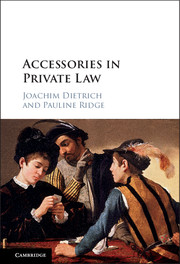2 - Identifying accessory liability in private law
from PART I - General principles
Published online by Cambridge University Press: 05 February 2016
Summary
Overview
This chapter identifies – by drawing upon first principles, the substantive principles of private law and, to a lesser extent, the criminal law – a form of liability that is appropriately characterised as accessory liability and that arises across private law. The chapter explains when a liability can be appropriately characterised as accessorial, regardless of whether it is formulated as an independent wrong or as a ‘secondary’ liability to the primary wrong of the primary wrongdoer (PW), and irrespective of the actual terminology used to describe that concept. The chapter explores the rationales of accessory liability and when it is needed in the law: that is, why it serves an important function in some areas of law and not in others. It explains why accessory liability is derivative upon another person committing a primary wrong, but need not duplicate, or replicate, PW's liability. Finally, this chapter distinguishes other forms of liability and explains why it is necessary to consider some non-accessorial, but related, liabilities in more depth, specifically ones concerning the protection of equitable property rights, recipient liability and the protection of statutory intellectual property (IP) rights.
Identifying accessory liability in private law
In simple, non-legal terms, ‘accessory’ means something that is additional to, or contributes to, something else. The core legal understanding of accessory accords with this meaning: an accessory is someone who is linked to another's wrongdoing in such a way as to be made responsible for its consequences. Such a generic statement, however, hides a range of more specific possible meanings. At its broadest, ‘accessory’ could encompass all situations in which the commission of a primary wrong is a prerequisite to another's liability and could, for example, therefore include vicarious liability [2.8.1], [5.3.1]. But such a meaning would be unhelpfully wide. A narrower meaning is one that focuses on wrongful conduct that contributes to the commission of another's primary wrong. It is this idea that forms the basis of our identification of accessories because, where such contribution exists, a number of common and overlapping rationales justify this narrower form of liability [2.4]. Furthermore, those rationales do not equally apply to any broader ‘accessory’ concept.
- Type
- Chapter
- Information
- Accessories in Private Law , pp. 10 - 28Publisher: Cambridge University PressPrint publication year: 2016



